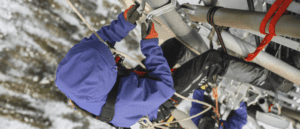IBC issues winter storm advisory for Atlantic Canada, Ontario residents

The Insurance Bureau of Canada (IBC) has issued advisories for Atlantic Canada and Ontario, warning residents of an incoming winter storm.
Environment Canada recently announced a forecast predicting heavy rain and strong winds across the Atlantic region, while causing rain, heavy snow, and strong winds in Ontario. The weather conditions are expected to persist through Saturday, and Environment Canada has issued winter storm warnings for the affected regions.
In response to the warnings, IBC is advising residents to be careful of the potential damage winter storms can cause.
“As we’ve seen before, winter storms can cause extensive damage,” said IBC Atlantic vice president Amanda Dean. “IBC wants to ensure that residents in Atlantic Canada are fully prepared for the heavy rain and strong winds that are currently forecast for the region.”
“Taking steps to prepare for a severe weather event is not only important for your personal safety, but for your financial security,” said IBC Ontario vice president Kim Donaldson. “IBC wants to ensure residents across Ontario are fully prepared for the potential hazards associated with this storm.”
How can you prepare for severe weather like winter storms?
IBC shared tips for those in Atlantic Canada and Ontario to prepare for the incoming severe weather.
Create an emergency preparedness plan for your family.
Move valuable items out of your basement to higher levels in your home.
Assemble disaster safety kits for your home, car and office.
If you have a detailed home inventory, check that it is up to date.
Prepare for power outages. Have flashlights and portable lighting ready. When using candles, always be mindful of fire hazards.
Protect or move property that might be damaged by flying debris. Park vehicles in a garage, if possible.
Have someone check your property if you are away.
Make sure downspouts are clear of debris and that they direct water away from your home to prevent ice-damming and basement flooding.
Charge electronics and have backup power sources available.
If you need to drive, clear all of the snow and ice from your vehicle before you start out. Drive according to the conditions.
Other tips that IBC has suggested – which should only be performed when it is safe to do so – include:
Keep your sidewalk and your home’s front stairs clear of snow and ice to prevent falls and injuries.
Clear snow from your roof and deck to avoid potential collapse, or hire a professional to clear the snow.
Clear snow and ice well away from natural gas or propane meters, exhaust vents and basement window wells.
Clear snow away from all windows.
To prevent exposed pipes from freezing, fit them with insulation sleeves or wrapping. Frozen pipes can break at their weakest point.
What is covered by homeowners insurance, and will it help with winter storm damage?
IBC also gave a reminder that it is important that homeowners speak with their insurance representative to ensure that they have appropriate coverage. The bureau also shared the following insurance reminders:
Water damage in a basement due to sewer backup is only covered if you have purchased specific, optional sewer backup coverage.
Damage to homes caused by wind is usually covered. This coverage includes damage caused by flying debris, falling branches or trees, and water entering through openings created by the storm.
If you have purchased comprehensive or all perils auto insurance, damage to vehicles from wind is usually covered. This coverage is not mandatory, so check your policy.
In certain circumstances, homeowners who are unable to return home due to insured damage are entitled to additional living expenses.
The National Oceanic and Atmospheric Administration (NOAA) Climate Prediction Centre recently released its US Winter Outlook report for December 2022 through February 2023, which said a third consecutive La Niña event will bring drier-than-average conditions across many areas. This weather system can cause “a wave-like jet stream flow across the United States and Canada, which causes colder and stormier than average conditions across the North, and warmer and less stormy conditions across the south.”






